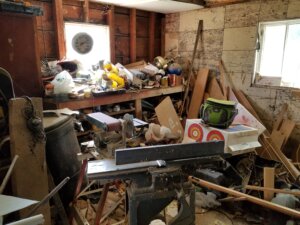
Have you visited your elderly parents and noticed an accumulation of “stuff” that seems to be overtaking their home? If you can’t navigate your way through the garage or there are rooms stacked to the ceilings with keepsakes, it may be time to talk to your parents about purging out some items. To approach this subject with sensitivity, it is important to recognize the reasons why your parents have saved everything throughout the years. What might seem excessive to you, may come from a history that is difficult to relate to unless you have lived it.
One of my favorite summer memories was going to stay at grandma’s house. When the thunderstorms would roll in, we’d run to the kitchen to get pots and pans to put under the downspouts to catch rainwater to water the plants, garden, and trees. She would darn socks and patch the holes in our jeans. I remember having to wash and reuse plastic bags, tinfoil, aluminum pie tins, and plastic ice cream buckets. This all seemed normal, and we never questioned why.
So, what is the why?
The Great Depression in the 1930s was a time of great economic hardship in the United States. Many people lost their jobs and their homes. Families struggled to make ends meet. Despite the difficult circumstances, people found ways to get through the tough times – they learned to be resourceful and make do with what they had, being thrifty was critical as money and supplies were hard to come by.
During WW2 rationing was introduced to conserve resources for the war effort. Rationing helped to ensure that everyone had access to essential items and prevented inflation. People had to queue for hours to get their rationed food, and often there were shortages of certain items. There were many things that were hard to come by during those years:
- Food: Fresh produce was in short supply, as most farmers were drafted into the military or working on the home front. Families had to get creative with their meals, using whatever they could find.
- Clothing: With materials in short supply, people had to make do with what they had. Many clothes were patched up and mended or made from scratch at home.
- Fuel: Gasoline was rationed during WW2, so people had to carpool or use public transportation whenever possible.
If your elderly parents grew up during the Great Depression and the World Wars, they might have experienced rationing or even hunger. Holding on to items, or hoarding things, is a natural response in case another emergency arises.
Older adults may also hoard items because they are dealing with dementia or other cognitive issues. They may not be able to remember that they already have ten bottles of shampoo, for example. Or they may be afraid that if they get rid of something, they will never be able to find it again.
Whatever the reason, hoarding can become a problem when it starts to interfere with daily life. If your parents are unable to use their stove because it is covered with newspapers, for example, that could become a serious safety hazard. When their “stuff” becomes a health or safety issue, it’s necessary to intervene.
Here are five tips for helping your elderly parents declutter their home to make the process go more smoothly:
1. Talk to your parents about the goals for decluttering. Is it to make their home more comfortable or easier to navigate? Are there health or safety hazards because of their stuff? Or is it simply because they don’t need so many things anymore? Once you establish some guidelines, you can tailor your approach accordingly. If there are fire, tripping or falling hazards, it’s important to take care of those immediately.
2. Help them sort through their belongings. This can be a daunting task, so it’s important to take it one step at a time. Don’t try to tackle the entire house all at once. Start with one room or even just a closet. Help them organize as you go. Schedule regular decluttering sessions. Once a week or once a month, set aside some time to help your parents declutter their home. This will make the task feel less daunting and will help keep their space clean and organized. If you find that helping your parent is too difficult or emotional, you may want to consider hiring (or helping them hire) a professional organizer or decluttering expert. You can ask around the local area for good recommendations from professional organizers who work well with seniors.
3. Get rid of items that are no longer used or needed. When decluttering, things like old magazines and broken items can probably just be thrown away. Gently used items are usually quite simple to donate; clothing that no longer fits and furniture still in good condition can then be appreciated and used in the future by others; if these things are no longer being used or are taking up space unnecessarily, this a great place to begin the purging process! Depending on your location, some organizations, like the Vietnam Veterans of America (VVA), will actually come to you to pick up clothing, shoes, kitchenware, small appliances and furniture, and electronics; you simply schedule a pickup time online with them and leave your donations in a visible location and their truck will come by to retrieve the items. In other cases, you may need to take the items to a local charity accepting donations.
4. Listen to the stories about their sentimental items. This is a good time to talk with your parents about why they have held onto something and whether they would like a certain family member or friend to have the item after they die. You might suggest that they give some of the items away and tell the story of where it came from and its sentimental value while they are still living. My grandmother had me tape names to the back of items at her home, to ensure that they went to the right person.
5. Be patient and understanding. This is a difficult process for your parents, these belongings represent a lifetime of memories, and they may not be able to let go of certain things as easily as you can. Remember, they don’t have to get rid of everything, organizing and slowly purging is a good start.
Following these tips should help make the process of decluttering your elderly parents’ home a bit easier and less overwhelming for everyone involved. Speaking from personal experience, it’s good to start downsizing the stuff while your parents can participate in the process. It will help create peace of mind for your parents and make cleaning up their estate easier once they are gone.
